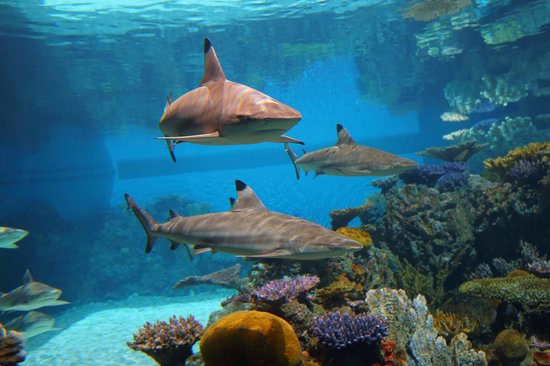11.24.19Field Trips Benefit from Background Knowledge, Too

Last week I wrote a post about hands-on learning, and how what seemed like a rich experience–launching rockets–might not be so useful if students didn’t know what they were looking at. On the other hand if students had been primed with knowledge beforehand they could observe relevant things and increase their knowledge by adding detail to it.
I was thinking about that at the National Aquarium in Baltimore last week, where I spent a few hours with my wife and daughter amidst several school tours.
I’m sure it was fun for everyone to have a day out at the aquarium but based on my observations of most of the school groups there wasn’t much learning going on. The kids ran from place to place shouting comments about the animals but showed almost little knowledge of them.
Cognitive science tells us that background knowledge helps students perceive more about what they are looking at and think more deeply about it. So if adults wanted to make a trip to the aquarium really valuable and memorable for kids, they’d prepare them in advance by, say, having them read up on the animals in advance or preparing questions they’d like to try to find answers to…or even better that they’d like to ask an aquarium staff.
The trip, in other words, is really as valuable as the preparation, and my hunch from watching four or five school groups was that there had been little to none. Put ’em on the buses and take ’em to the aquarium. That has to be educational. So it was fun…which is great…but it could have been both fun and educational–the kind of trip that kids remember, that helps them understand the marine world in new ways.
Stacey Shells, one of the best school leaders I’ve worked with, always meticulously prepared her kids for field trips. When they went they usually amazed their hosts and guides. I remember once when she took her students to visit the studio of Albert Paley, an artist who works with metal sculpture, one of her students asked whether a tool in his studio “was the kind of thing that helped him create the animals for the gates of the St. Louis Zoo.”

In other words, they had studied examples of his work before they went and discussed what was unique and challenging about it. And then when they visited they understood so much more. And not incidentally they noticed the way adults reacted to you differently of you took the time to show your knowledge preparation and intellect.
I found myself wondering how much more those kids would have understood in the jellyfish exhibit, say, if they’d understood why the Cassiopea jellyfish spent it’s life upside down–it uses photosynthesis. They might have understood the movements (jockeying for positions) among the hundreds in a display. They might have had something other to say than that they were “gross” or “stupid.”
Side note: There were also a fair number of kids banging on the glass and shouting when staff were explaining animals to other visitors. Really if you’re running a field trip you need to explain a few things to kids about how to behave in advance. Helping young people understand what’s appropriate in a given setting is what adults are supposed to do.
